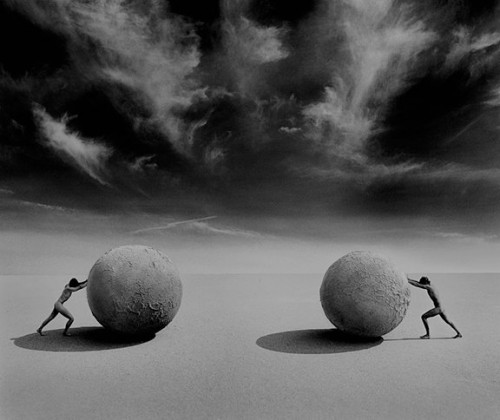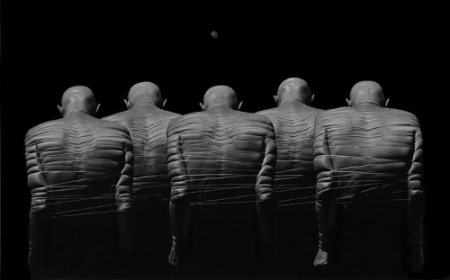
There are several reasons why most people do not approach conflicts in the right way. The basic one is – they see the conflict as a problem, while the conflict has always been an inevitable process that keeps repeating itself on our way to growth, and overcoming it leads to final synchronization of two individuals, of an individual and the environment, of two groups of people, etc. The problem for most people is coming to terms with the constant change itself; with overcoming something over and over again.
The man is used to “fighting” for comfort and boundaries within which he feels safe. Those boundaries inevitably lead to the degradation of the body, which weakens without a constant challenge, the body and the mind feel numb, and the established, almost traditional rules of living lead to a kind of self-sustaining utopia – once an individual becomes attached to that established process, when s/he invests resources into it, when s/he is in debt, it is hard to separate oneself from it because of all the commitments, and s/he represses the conflict that s/he feels, even to such a degree that specific topics cause fear that evolves into anger, a defensive mechanism which is also analyzed, as well as the painful core itself. But then again, the individual is the one who choses whether to realize the error or become attached to the belief which is currently dominant depending on the situation.
The impact of the whole external sociological structure is also worth mentioning because it plays an important role considering it is the reference system with the strongest impact on the boundaries an individual creates for himself. If we live in a world where “problems” are envisaged with the help of simplification and vulgarization, and what is proper is displayed in golden colors, then we might need to realize the economic fatality to which we aspire, stop ourselves and perhaps learn the importance of reconciliation of differences, and not of their elimination. The history repeats itself. Our obligation is to understand why.
We will now briefly deal with those instinctive impulses which are still strong and still cause quite a stir even though we live in a “civilized” period. The main problem here can be the negation of those impulses, which leads to the unconscious expression in an unwanted period. Studying of the dark side of your own personality is not something that is recommended as desirable at the present time and it is unlikely that you would run into a doctor who would support you in that endeavor. Of course, there must be a considerable number of cultures which will justify any kind of destruction, and you can always justify your actions through some of them, but that is probably not what we need. Rituals and initiations are not uncommon phenomena throughout the history, and they used to represent a very important period in the life of an individual. Reptilian dependence was depicted through myths in the period of alienation between a hero and his struggle with snakes, dragons, etc. Today, there are initiations, they have found their way to the surface, but they are misguided and due to lack of awareness of what they are, they express themselves through wrong attitudes and wrong ideology. Unification of opposites is of vital importance, as Jung states, and consciousness yearns for that solution.
“Undefended, receive yourself unto yourself, the high, the low, the unselfish, the selfish. Only as the pressure of the powers of darkness make themselves felt as your impulses and your desires will you realise that at your soul’s centre rage the cosmic and transcosmic conflicts. Only then will you feel as helpless as a little child: only then will you yearn for help.” Jonathan Hanaghan
What should be realized as an error in interpretation is that the return of infantilism is not the same as the helplessness in the whirlwind of our own chaos. In this quote lies the fundamental importance of observing everything around us as a transient process, consideration of changes in the right way.
The next item is the connection to the concept of “victory”, which directly stems from beliefs about competition. That which is counterproductive is also paradoxical, because victories do not teach us anything, except maybe the fact that we sharpen our egos (it should be noted that the ego is rejected only when sharpened, and a variety of wisdom and “reject your ego” quotes typically fail at this). Defeat is an experience which has not been given enough attention throughout history. Of course, one should not get attached to one or the other aspect, but should become aware of their relations and perhaps the fact that people cannot be free from either of them. In a world of finite solutions it is difficult to accept such an attitude. The consequences will inevitably follow – once the painful core is activated, anger is manifested, and the cycle closes again.
There are a few more essential items which should be mentioned in order to understand the nature of conflict. Body language, facial micro-expressions – by activating specific sore spots we give certain body parts significance and relate them to physical conflict. A man brought to the brink of his tolerance will react in different ways depending on where he is endangered. The moves range from surprise attack, deliberate attack, we can realize that the person is experienced in such situations, whether the person’s attitude indicates the already existing similar experiences, whether he is proud of those situations, whether he is emotionally provoked (e.g. passionate actions lead to attempted strangulation), whether he feels inferior (possibly helping himself with additional weapons, calling for backup,…), etc.
This is a more extreme part which is interpreted. The other part helps us realize where the sore spot is, what are the defensive mechanisms, and what they are based on. Sometimes these experiences are just a wave to be observed as it comes and goes. Sometimes it is more waves. Sometimes it is a storm, maybe even a tornado. If you remain tied to the shore you never experience real danger, and that will be your choice. But do not pity and hate the ships that sail into the unknown. Do not characterize them as outcasts from society, as intruders. Make a historic step forward and admit the defeat.
Each of the mentioned theses is studied in more detail, written text serves only as an introduction to the topic that is of crucial importance because we have stopped living in a world at war and a step forward has become logical ever since the invention of the first atomic bomb. The peak of the Cold War was a transition point when all of humanity realized their own mortality. We are now lagging behind the old culture and living in a world which is slowly turning into a comical mix of Orwell’s and Huxley’s predictions. That is a necessary process that follows in accordance with the change that occurs, but consider whether you support a fixed idea which fits your path of least resistance, or the change.
For P.U.L.S.E World: Srđan Mutlak

